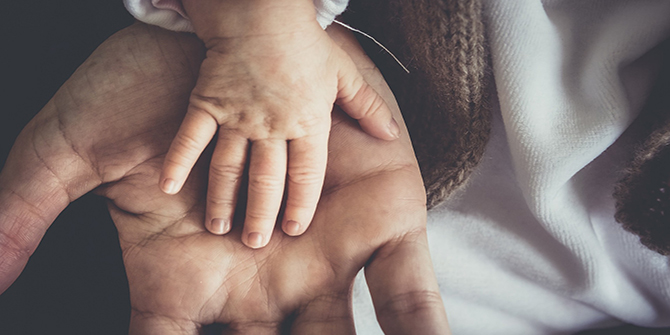 The impact of the ongoing pandemic is having different effects on men and women, yet the government has failed to take these differences on board when responding to the situation. Jenna Norman sets out the immediate areas that need to be addressed, both as a response to this specific emergency but also in terms of long-term change.
The impact of the ongoing pandemic is having different effects on men and women, yet the government has failed to take these differences on board when responding to the situation. Jenna Norman sets out the immediate areas that need to be addressed, both as a response to this specific emergency but also in terms of long-term change.
Coronavirus is a public health crisis causing a global economic crisis. Like all emergencies, it collides with existing health and socio-economic inequalities which mean that although many people all over the world are now riding the same storm, they are doing so in very different boats.
This is particularly the case for women the world over who, although are significantly less likely to die from the virus, are already bearing the brunt of the ensuing economic crisis. In the UK, women are the majority of frontline workers (77%), the majority of low paid (69%), and the majority of people with caring responsibilities, paid and unpaid. Women do, on average, 60% more unpaid care work than men, leaving them with less time for paid work. This means they are more likely to be in poverty, more likely to rely on public services and social security, and more likely to be exposed to the virus. In fact, new data from the British think tank, Autonomy, showed that of the 3 million people in ‘high risk’ jobs, 77% of them are women. A million of these vital workers are being paid beneath the poverty line and 98% of these neglected workers are women.
Clearly, women are also in very different boats: Black, Asian, and Ethnic Minority women are overrepresented in the health force, for example, and latest figures suggest they are disproportionately suffering from Covid-19. Disabled women have had their care standards ‘relaxed’ by the Coronavirus Act 2020 and face serious difficulties if their assistants need to self-isolate.
Meanwhile, the threat of recession and widespread job losses will be felt most by women in low-paid, precarious jobs and single mothers. BAME workers are over a third more likely than white workers to be in precarious work, demonstrating their increased risk to loss of hours and earnings. Pregnant women have been all but forgotten by the government’s response, whilst we are already seeing an increase in domestic abuse. For women in refuges, prisons or detention centres, social distancing seems near impossible.
These are just snapshots of the complex, interconnected and overlapping ways, in which the crisis is having particular consequences for different groups of women in the UK. The government has demonstrated unprecedented agility in responding to the crisis with extraordinary measures and schemes announced to mitigate the worst effects. On the one hand, this demonstrates that change is both possible and desirable: it leaves the logic of a decade of ‘market-correcting’ austerity and xenophobia in tatters and acknowledges that in the face of crisis, things can change fast. Yet on the other hand, there remain some gaping holes in the government’s response efforts stemming from their lack of understanding about how gender positions women and men differently within the economy.
For example, aside from the flawed salary retention schemes, the government has hardly tweaked the social security system at a time when a collective safety net has never been more important. Sick pay is still just £95.85 a week whilst those claiming Universal Credit to make up for income loss still have to wait five weeks for their first payment. For many people, that’s two rent payments and/or five weeks of feeding a family. Many of the punitive and discriminatory designs of Universal Credit continue to disproportionately impact women and low-income families, including the benefits cap and two-child limit, which means that families cannot claim more social security if they have more than two children. With child benefit also frozen and children off school, this is having serious ramifications for many families across the UK.
Many migrant women still cannot even claim social security thanks to the ‘No Recourse to Public Funds’ condition stamped on many non-EU visas. The painful irony here is that many migrant workers are disproportionately represented in ‘key worker’ occupations – such as care work where one in five care workers is a foreign national – yet they pay for the NHS twice through taxes and the immigration health surcharge; yet they would not even qualify for a visa under the government’s plans for a points-based immigration system.
The intersection of migration status is even more frightening for undocumented women who may be fearful of using the NHS due to links with immigration enforcement. It’s rarely been more important that the social security system provides a safety net for all women.
A generous and sustainable social security system is also integral to keeping women safe at this time. We’ve already heard of spikes in domestic abuse as a result of self-isolation. Abuse can be physical, mental, and/or economic. Financial hardship caused by the government’s lax repose to Covid-19 increases women’s vulnerability to abuse by making it harder (and more expensive) to leave a partner. Meanwhile the organisations which support women through this are also suffering from decades of financial neglect.
It truly feels as though Covid-19 presents a reckoning of our socio-economic systems, demonstrating that our priorities are upside down and back to front. Whilst many cooped up at home cannot wait to go ‘back to normal’, we now have a responsibility to ensure that we do not go back to normal if normal means a small state, vast gender inequalities in earnings and employment, a hostile environment and the devaluation of care work. We cannot expect women in high-risk jobs to continue to put their lives on the line without liveable pay and permanent contracts, including adequate sick pay. We cannot demand that migrant nurses pay for the NHS twice but then cannot pay their rent. If COVID-19 shows us anything, it is that we can do things differently. And we must.
____________________
 Jenna Norman is the Public Affairs Officer at the UK Women’s Budget Group who will launch the findings of their Commission on a Gender-Equal Economy in Autumn 2020. The Women’s Budget Group full report ‘Crises Collide: Women and Covid-19’ is available here.
Jenna Norman is the Public Affairs Officer at the UK Women’s Budget Group who will launch the findings of their Commission on a Gender-Equal Economy in Autumn 2020. The Women’s Budget Group full report ‘Crises Collide: Women and Covid-19’ is available here.
Photo by Tim Mossholder on Unsplash







